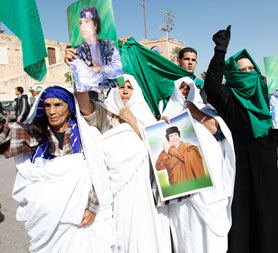Dozens dead in Libya anti-government unrest
Violent protests in Libya have killed at least 24 people, rights activists say, as unrest spreads in the region. Leader Muammar Gaddafi makes a brief appearance with supporters in the capital.
Rare demonstrations in Libya, inspired by events in Tunisia and Egypt, have left dozens dead and many more wounded in clashes between police and anti-government protesters.
Human Rights Watch says that – according to its sources – security forces have killed at least 24 people in crackdowns on Wednesday and Thursday. Unconfirmed accounts have circulated online that the number of dead may be much higher.
Soldiers deployed in the streets of Libya’s second city Benghazi on Friday after thousands of people demonstrated over the killings by security forces.
Gatherings of large crowds are uncommon in Libya where dissent is rarely allowed, but unrest has spread to other Arab countries following uprisings in Tunisia and Egypt.
There have been reports of protests in five other cities across Libya.
Vast amounts of video footage and still pictures have emerged online, appearing to show violent confrontations between anti-government protesters and the security forces.
The footage includes people throwing rocks at armoured vans amid streets littered with debris, burning cars and crowds of people tearing down a government statue.
Graphic details of wounded people, with bloodied faces, being carried away by crowds also appears to have been documented.
A list identifying people killed has been posted by online activists with ages of the dead ranging from 13 to 36. Channel 4 News has been unable to verify the reports.
'Soldiers storm hospitals'
Armed soldiers are storming hospitals tending to those wounded in anti-Government protests in Libya and dragging them away in the middle of the night, a nurse in Benghazi has told Channel 4 News.
A nurse in a Benghazi hospital told Channel 4 News on Friday that in the last two days, "at least" 15 people had died in the hospital from gunshot wounds and two men they had treated "were still unconscious after two days after suffering injuries (which appear to have been caused by) being hit so many times by the ends of guns."
The nurse said that on Thursday night, armed men wearing "military or police" uniforms - "they had not seen before" - entered the hospital at around 2am, and carried away three patients who were involved and injured in the protests that night.
Read more...
Gaddafi appearance
In the early hours of Friday, Muammar Gaddafi, Libya’s leader for more than 40 years, appeared briefly at Green Square in the centre of Tripoli where he was surrounded by crowds of supporters, but he did not speak.
State television showed pictures of the leader, while several hundred people chanted pro-government slogans.

The privately-owned Quryna newspaper, based in Benghazi, said security forces overnight in the city fired live bullets at protesters, killing seven of them. It cited a security source.
The newspaper published photographs of several people with bloodstained bandages lying on hospital stretchers.
Another resident in Benghazi, who said he had been in contact with people in nearby al Bayda, said there had been more deaths in that town overnight, adding to at least five killed on Wednesday and Thursday.
Tight controls on media and communications in Libya made it difficult to assess the extent of the violence. But on Friday unverified reports on social network sites said that up to 50 people had died. There was no official comment on the violence.
Gaddafi’s opponents say they want political freedoms, respect for human rights and an end to corruption. Gaddafi says Libyans enjoy true democracy.
Yemen unrest escalates
At least two people have been killed in similar clashes in Yemen where unrest has broken out in recent weeks.
One person was killed and others wounded after a grenade was thrown at anti-government protesters camped out in the city of Taiz.
“It’s just shameful that the government would resort to these criminal tactics,” a protester said. “But it won’t scare off the protesters.”
At least 10,000 protesters were gathered in Hurriya Square, and similar numbers of Saleh loyalists were rallying in downtown Taiz, around 200 km south of Sanaa.
In Bahrain thousands turned out to bury three of those killed on Thursday after police stormed a protest camp on Pearl Square in the capital Manama. Click here for more on the protests from the Channel 4 News correspondent on the ground.
Egyptian celebrations
Millions of Egyptians held a “Victory March” on Friday one week on since a popular uprising toppled President Hosni Mubarak from power after 30 years.
Thousands of people poured into Tahrir Square in central Cairo which became the centre for the unrest that spread across Egypt leaving more than 300 dead.
Sheikh Yousef al-Qaradawi, a Qatar-based preacher and one of the first to back the revolution, called on the army to form a new government and free political prisoners.
Following Friday Prayers, the spiritual leader urged worshippers in the world’s most populous Arab nation to be patient with the new military rulers.
“I call on the Egyptian army to liberate us from the government that Mubarak formed,” Qaradawi told the faithful at noon prayers in Tahrir (Liberation) Square, after which the huge crowd cheered and waved national flags in jubilation.




